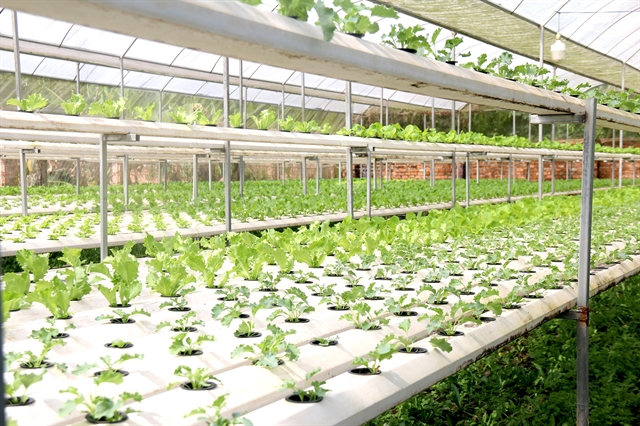 Society
Society


|
| Growing hydroponics vegetables at the Tiến Phát Vegetable Co-operative in Bình Thuận Province’s Đức Linh District. – VNA/VNS Photo Nguyễn Thanh |
BÌNH THUẬN – Restructuring agriculture has helped the south – central province of Bình Thuận reduce fallow farmlands, adapt to climate change and improve farmers’ incomes.
One of the country’s driest provinces turned to other crops including fruits on nearly 8,900ha of unproductive rice fields last year alone.
The model of growing a vegetable crop annually along with one or two rice crops on the same field offers farmers 10 – 30 per cent higher income than rice monoculture, according to the local Plant Cultivation and Protection Sub-department.
The restructuring has also helped resolve the shortage of water during the dry season, it said.
Nguyễn Đình Thương of Đức Linh District’s Vũ Hoà Commune has been growing a rice crop in the rainy season and a sweet potato crop in the dry season since 2020 instead of growing three rice crops a year like he used to.
He grows a Japanese sweet potato variety which lasts 3.5 – 4 months and gets a yield of 25 tonnes per hectare.
“After deducting all costs, the income is VNĐ70 – 100 million (US$3,000 – 4,400) per hectare, many times higher than from rice,” he said.
Many farmers in the commune have pooled their lands to grow the sweet potato, and the total area now is 35ha.
The Japanese sweet potato is ideal to grow in areas lacking water, and helps farmers diversify their agricultural products and increase their incomes, according to the commune Farmers Association.
Besides switching to other crops, farmers also use advanced techniques to improve production efficiency and meet market requirements.
Nguyễn Thị Hoà of Vũ Hoà Commune switched from rubber to hydroponics vegetables in a polygreen house three years ago, and her products are sold in clean vegetable shops in Đức Linh District markets and HCM City.
With the high demand for clean vegetables, Hoà has joined hands with other nine other farmers to set up the Tiến Phát Vegetable Co-operative for growing hydroponics vegetables on a total area of 3,000sq.m.
In 2020, the co-operative’s vegetables were recognised as three-star OCOP products under the national ‘One Commune – One Product’ (OCOP) programme.
Because vegetables are planted in polygreen house, they are not affected by the polluted environment or pests, grow well, have sufficient nutrients, and fetch higher prices, Hoà explained.
“To ensure the quality of OCOP products, our vegetables are grown without using pesticides or chemicals, and the nutritional components used for growing vegetables meet required standards.”
Trần Ngọc Hà, deputy chairman of the Vũ Hoà People’s Committee, said the commune is developing high-value farming models like hydroponics vegetables and rotating Japanese sweet potato with paddy, and they help farmers gradually switch to higher value crops and improve incomes, he said.
The People’s Committee is encouraging farmers to switch to vegetables in combination with aquaculture in fallow orchards to increase incomes, he said.
It would collaborate with Đức Linh District agencies to expand effective farming models and teach farmers new techniques with less use of chemical fertilisers, he said.
The average income of the commune has increased from VNĐ20 million ($890) a year in 2013 to VNĐ49.4 million ($2,200) now, he said.
Đức Linh is one of the province’s leading districts in restructuring agricultural production and linking up producers and buyers of agricultural products.
Rice farmers there now have contracts for 10 per cent of their annual output, or 13,500 tonnes.
The province plans to switch to other high-value crops and aquaculture on 596ha of unproductive rice fields this year.
Outlet promotion
The provincial People’s Committee has instructed the Department of Agriculture and Rural Development, other relevant departments and localities to take measures to boost sales of agricultural products, especially dragon fruit, that are now being harvested.
The country’s largest dragon fruit producing province has more than 33,000ha under it and an annual output of 700,000ha.
The Department of Industry and Trade has promoted the sale of Bình Thuận’s agricultural products to other provinces and cities, focusing on retail chains and supermarkets.
The provincial Farmers Association has tied up with the Post Office to help farmers sell their products on its e-commerce platform, PostMart.vn.
Under this co-operation, the association collects information about 12,000 farming households to introduce and sell their products both on the platform and the two parties’ sales points.
The agricultural products prioritised on the platform include VietGAP standard and OCOP products besides other clean products.
Nguyễn Phú Hoàng, chairman of the provincial Farmers Association, said the association and Post Office would also provide information and teach farmers skills to change their selling methods, buy inputs and use digital technologies in farming. – VNS




